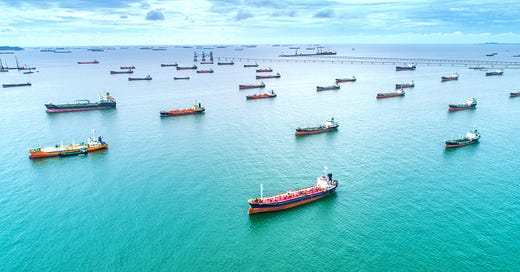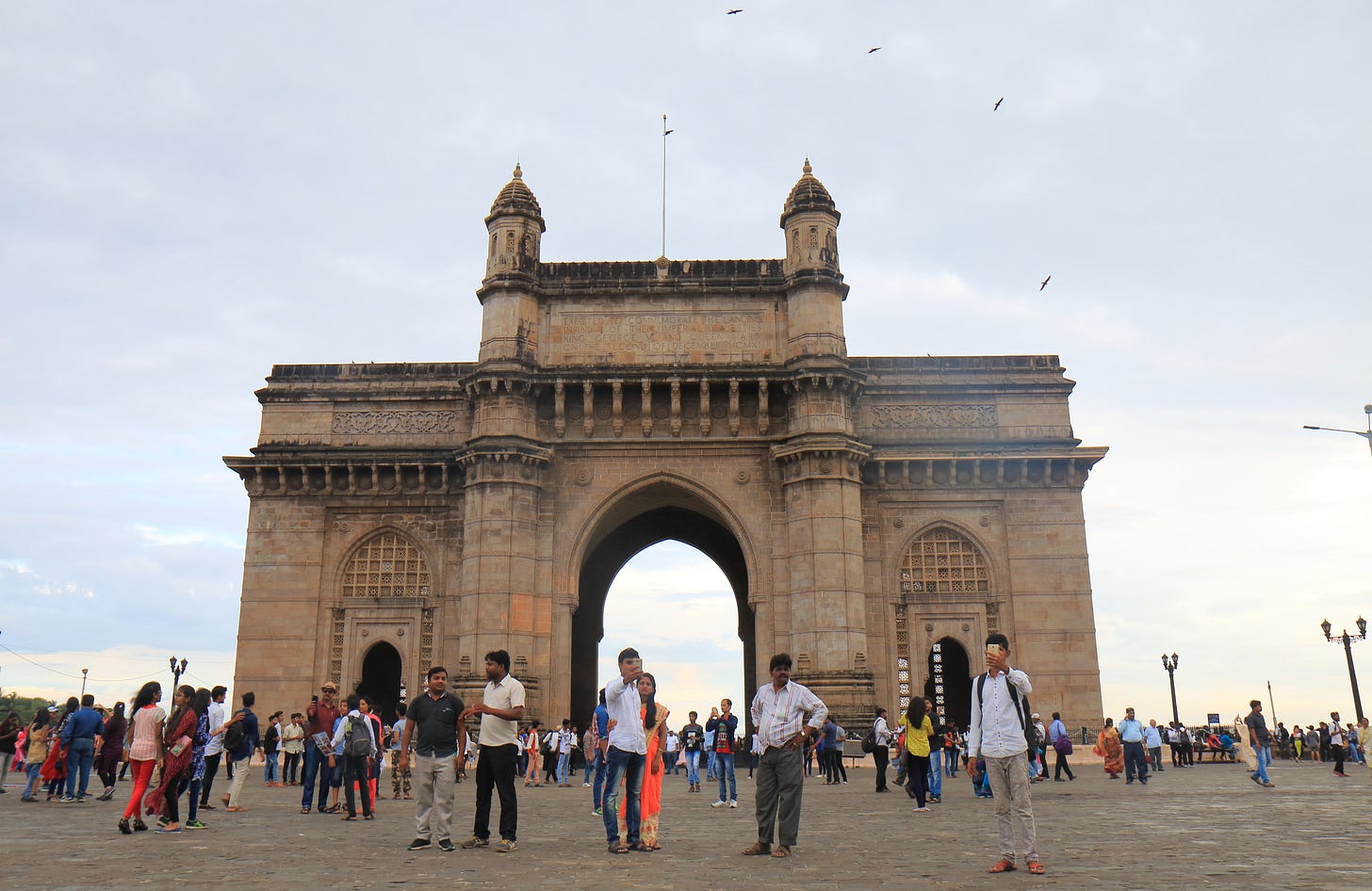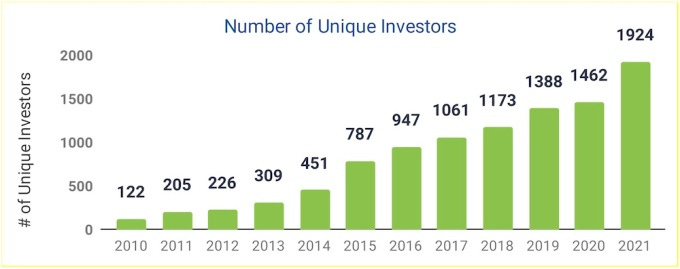Emerging Markets Daily - January 1
LNG and Coal Lead '21 Commodities Boom, Asia Trade Pact Kicks In, India's Sizzling Startups, Nigerian Naira Plunges Again, Global Stocks Deliver Third Year of Gains
The Top 5 Stories Shaping Emerging Markets from Global Media - January 1
LNG and Coal Lead 2021 Commodities Rally
“Global demand for commodities is expected to remain robust in 2022 and underpin prices as the world economy continues to recover, although similar price jumps are unlikely, analysts and traders say.”
The National/Reuters
“Commodity prices from energy and metals to agricultural products rebounded sharply in 2021, with power fuels leading the rally, driven by tight supplies and a strong economic recovery as Covid-19 vaccinations staved off widespread lockdowns.”
“Global demand for commodities is expected to remain robust in 2022 and underpin prices as the world economy continues to recover, although similar price jumps are unlikely, analysts and traders say.”
“‘2021 has been characterised by a huge broad-based rally,’ said Jeffrey Halley, a senior analyst at brokerage Oanda. Although I believe commodity prices will remain robust, I believe the rebound in 2020 and the rally of 2021 will be exceptional years, and as such I am not anticipating the same level of gains in the year ahead.”
“Energy and food prices rocketed higher this year, hammering utilities and consumers from Beijing to Brussels, raising inflationary pressures. High prices are encouraging producers to ramp up output, but some analysts expect supplies for products such as oil and liquefied natural gas to stay tight as these projects require years for production to come on line.”
“Record coal and natural gas prices led to a severe power crunch from Europe to India and China in 2021. Asian LNG rallied more than 200 per cent, while Asia's benchmark coal prices doubled.”
“Global oil prices also recovered 50 per cent to 60 per cent in 2021 and are set to rise further in 2022 as jet fuel demand catches up. In China, coal prices have more than halved from a record high reached in October after the top producer and consumer boosted output and tamed prices.”
“…For beverages, arabica coffee added almost 80 per cent, taking gains into a second year and robustas jumped 70 per cent, recouping three years of losses, as supply chain issues increased appetite.” (For more on the global coffee market, see the Emerging World column - “Globalization in a Mug.”)
Precious metals prices may cool, dragged down by strong risk appetite in equities and other markets, analysts say. The National reports.
Asian-Pacific Trade Pact Kicks In As China Seeks to Lead Regional Integration
Nikkei Asia
“An Asia-Pacific agreement to create the world's largest trade bloc entered into force on Saturday, ushering in a new phase of regional economic integration.”
“The launch of the Regional Comprehensive Economic Partnership comes as countries seek to escape the pandemic malaise and shore up supply chains while China, the group's largest member, strives to raise its profile in Asia's mechanisms for integration. How Beijing opens its economy through the pact will be closely watched as the U.S. -- not party to the deal -- prepares a response of its own.”
“RCEP encompasses 15 Asia-Pacific countries covering about 30% of the world's gross domestic product and population. Initially, it takes effect among 10 members that completed ratification earlier: China, Japan, Australia, New Zealand, Brunei, Cambodia, Laos, Singapore, Thailand and Vietnam. South Korea will follow on Feb. 1. The remaining four signatories are Indonesia, Malaysia, Myanmar and the Philippines.”
“One practical effect of RCEP coming into force is that businesses and supply chain partners ‘will be able to enjoy preferential treatment for exports to, and investments in [the first 10 countries] from Jan. 1, and South Korea from Feb. 1,’ said Locknie Hsu, a professor at Singapore Management University. ‘This can significantly enhance regional economic connectivity.’”
“RCEP will have a ‘significant impact’ on international trade, the United Nations Conference on Trade and Development (UNCTAD) noted in a study published in mid-December. ‘The economic size of the emerging bloc and its trade dynamism will make it a center of gravity for global trade.’” Nikkei Asia reports.
In Record Year, Indian Startups Raised $39 Billion in 2021
Tech Crunch Asia
“In late March last year, as the virus started to spread across India, investors began to worry about the impact a potential pandemic could have on their portfolio firms. They exchanged notes, and on April 1, penned a joint open letter to the local startup ecosystem, advising firms to ‘prepare for the worst.’”
“In the months that followed, the virus engulfed the South Asian market and, among other things, hit the brakes on funding activity. Scrambling to steer through the unprecedented event, startups began to cut expenses. Some didn’t survive, and a few got acquired in fire sales.”
“Investors were right about the impact the virus would have on the country, and by extension, on the firms attempting to fuel the economy. But very few were prepared for what was about to happen in just a few quarters.”
“Scores of startups, many operating in edtech and fintech categories, began to report fast growth. ‘We started to see three years and five years of growth in one year,’ said Ashish Dave, chief executive of Mirae Asset Venture’s India business.”
“While several investors, including many tier 1 funds that are generally very active in India, were still cautious, a group of investors including Tiger Global, Falcon Edge Capital, and SoftBank shifted into a higher gear…”
“In a letter to investors in February, Tiger Global said the opportunity it sees in areas such as consumer, enterprise, and financial technology in the U.S., China, and India is ‘very large relative to the amount of capital we manage and evolving at a rate that is often hard to comprehend.’”
“Several factors worked in India’s favor, many investors said. There’s an abundance of dry powder in the market and investors are increasingly looking at growth avenues such as emerging regions as their next big bets. It also helped that Beijing enforced a series of crackdowns on its own startups and made it difficult for foreign money to flow into China.” Tech Crunch reports.
Nigerian Naira Plunges to Record Low, Marking 9 Years of Decline
Bloomberg
“Nigeria’s currency plunged to a record in the spot market on Friday, narrowing the gap with the rate that investors and exporters pay for the naira. The currency, which is managed by the central bank, fell 2.2% to a record 424.27 versus the dollar as of 2.46 p.m. on Friday. It was the biggest drop in the official exchange rate since Feb. 23. The currency has weakened every year since 2012.”
“The naira has fluctuated widely this year around a largely fixed spot rate of around 415 as investors try to gauge the central bank’s exchange rate direction. The Central Bank of Nigeria has been selling the greenback at between 437 to 444 naira per dollar to investors since early October.”
“Africa’s largest economy operates multiple exchange rates including a rate for investors and exporters, and others for government transactions, small businesses and travelers in a bid to manage demand for the greenback.”
“The Abuja-based central bank has devalued the currency three times since March 2020 as lower oil income put pressure on the nation’s reserves, though it has resisted calls by International Monetary Fund and the World Bank has for a merger of the multiple rates.”
“The central bank is unlikely to allow a convergence of the exchange rates in a pre-election year, said Cheta Nwanze, a lead partner with SBM Intelligence. ‘That is a huge political risk,’ Nwanze said.” Bloomberg reports.
Global Stocks Deliver Third Year of Double Digit Gains
Financial Times
“Global stock markets closed out 2021 with double-digit gains for the third year in a row, as easy monetary policy and a flood of fiscal stimulus helped propel an economic recovery from the pandemic.”
“The FTSE All-World share index rallied 16.7 per cent in dollar terms in 2021, surpassing the previous year’s 14.1 per cent gain, but coming up short against the blockbuster 24 per cent jump in 2019, the year before the coronavirus crisis.”
“Investors came in to 2021 bullish about the year ahead, with vaccines beginning to be rolled out and pent-up demand expected to result in an economic resurgence. Supportive policies from many of the world’s largest central banks helped to push financial markets higher, bolstered by government stimulus packages and a re-emergence from the most severe restrictions put in place to try to contain Covid-19 infections.”
“…standing in contrast to strong gains across developed markets, Hong Kong’s Hang Seng index sunk more than 14 per cent, weighed down by a regulatory crackdown by Beijing, which particularly targeted the education and tech sectors. The mainland China CSI 300 index fell more than 5 per cent.”
“The drop contributed to a 5.3 per cent decline in dollar terms in the broader MSCI Emerging Markets index. A similar index from MSCI that excludes Chinese stocks rose more than 9 per cent.”
“Heading into 2022, investors remain cautiously optimistic about the potential for stocks to continue their upwards trajectory.” The FT reports.
“Life isn't about finding yourself. Life is about creating yourself.” - George Bernard Shaw







